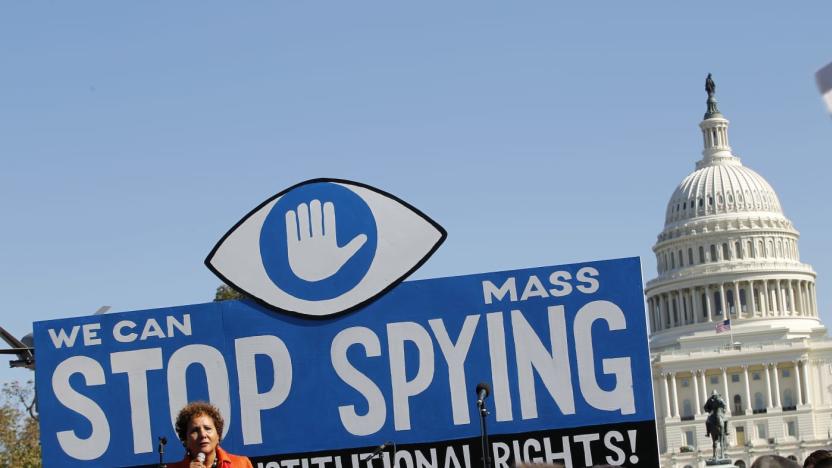DirectorOfNationalIntelligence
Latest

US intelligence releases report linking Russia to election hacks
As promised, the US intelligence community has released the public version of its report connecting the Russian government to election-oriented hacks... and it isn't pulling any punches. The findings directly accuse Russian President Vladimir Putin of ordering an "influence campaign" to destabilize the American vote, with hacks as a major component. The authoritarian leader wanted to both "undermine public faith" in the democratic process and "denigrate" Hillary Clinton to make sure that Russia's preferred candidate, Donald Trump, took office. Many of the unclassified details will seem familiar, but the US notes that its conclusions are drawn from both intelligence collected by the CIA, FBI and NSA as well as knowledge about both the Kremlin and the organizations it props up.

National Intelligence director James Clapper stepping down in January
While it doesn't come as a surprise, Director of National Intelligence James Clapper has submitted his resignation effective at the end of the Obama administration in January. Clapper said multiple times over the last year that he planned to resign at the end of President Obama's second term and today he made it official. The intelligence chief has explained that after 50 years of service, it was time for him to step down.

CIA and NSA doubled their searches for Americans' data in 2 years
So much for US intelligence scaling back its curiosity in the wake of Edward Snowden's leaks. An Office of the Director of National Intelligence transparency report has revealed that the CIA and NSA doubled the number of searches for the content of Americans' communications in an NSA database between 2013 and 2015. Where the two agencies made about 2,100 such requests three years ago, they searched 4,672 times last year. Just what triggered the spike isn't clear. There's a chance that some of the increase comes from repetitive searches (that is, running similar queries more than once), but they were also factors in 2013 -- the odds are that activity went up.

Congress asks the NSA how often it spies on Americans
Thanks in part to leaks, it's no secret that the National Security Agency's foreign intelligence gathering also covers some Americans. But just how many Americans are under watch, and how many are simply innocents caught in the crossfire? Congress wants to find out. The House Judiciary Committee has sent a letter giving Director of National Intelligence James Clapper until May 6th to provide a "rough estimate" of how many Americans are swept up in spying under the Foreign Intelligence Surveillance Act. While the NSA is supposed to keep the collection of US data to a minimum, it's not clear that the current approach is effective. There's a concern that many people are unnecessarily included, opening the door to abuse.

The teen hackers who cracked the CIA chief's email are back
"Crackas With Attitude," the hacking group that reportedly broke into CIA chief John Brennan's personal email last October (and whose contents have since been released by Wikileaks), have once again made headlines by infiltrating a number of personal accounts owned Director of National Intelligence, James Clapper's.

US leaders meet with tech CEOs to fight terrorism online
The US is determined to knock terrorists offline whenever it can, and it's about to go to great lengths to make sure that happens. Business Insider, the Guardian and the Wall Street Journal understand that some of the country's highest-ranking officials are meeting with the CEOs of internet giants like Apple, Facebook, Google, Twitter and Yahoo to ask for stronger efforts to fight online terrorist activity. And we do mean high-ranking -- the directors of the FBI, National Intelligence and the NSA will be involved, as will the Attorney General and the White House's chief of staff.

US fines over data requests would have destroyed Yahoo in a year
The US government's threat that it would fine Yahoo $250,000 per day back in 2008 was bad enough by itself, but declassified documents show that the penalties could easily have been much, much worse. Marc Zwillinger and Jacob Sommer (who were on Yahoo's side in the case) note that $250,000 was merely the baseline, and that the requested fines would double for every week that Yahoo refused to hand over user data. There wasn't a ceiling, either. At that rate, holding out for any significant amount of time would have been impossible -- Yahoo would have lost all of its assets, or $13.8 billion, in just over a year. As such, the fine wasn't so much a punishment as a weapon that forced the internet firm to comply with a surveillance order it was planning to contest in court.

The NSA's 2013 transparency report is more opaque
In an attempt to offer transparency to United States surveillance tactics, the Office of the Director of National Intelligence released a report today offering numbers for National Security Agency actions in 2013. The report notes thousands of orders placed for use of surveillance tactics (FISA requests: 1,899 in total), but fails to mention who or what was being targeted, not to mention exactly how. It recounts thousands of requests to the Foreign Intelligence Surveillance Court -- the court that decides which surveillance tactics are considered legal by the US government -- and thousands of "targets" (90,601). However, issues arise immediately. The word "target" is defined as such: "[It] has multiple meanings. For example, 'target' could be an individual person, a group, or an organization composed of multiple individuals or a foreign power that possesses or is likely to communicate foreign intelligence information that the U.S. government is authorized to acquire."

NSA violated privacy protections from 2006 to 2009, pins blame on confusion
By now, it's no secret that the NSA has courted privacy violations, but new documents divulge just how long such incidents have occurred. Director of National Intelligence James Clapper released approximately 1,800 pages of declassified files, which reveal that the NSA's phone record program violations happened between 2006 (when it first came under court supervision) and 2009, when the Foreign Intelligence Surveillance Court ordered changes to the operation. During that period, a total of 17,835 phone numbers were listed for checking against Uncle Sam's database, and only about 1,800 were based on the standard of reasonable suspicion. According to Clapper, congress received the papers we're seeing now at the time of the incidents, and corrective measures have been put in place. Among the preventative actions are a complete "end-to-end" review of telephony metadata handling, the creation of the Director of Compliance position and a fourfold increase of the compliance department's personnel. As it turns out, the missteps are (again) said to have been accidents. "There was nobody at the NSA who had a full understanding of how the program worked," an intelligence official claims. Sure, the increased transparency is certainly welcome, but a recently-leaked NSA audit from May of 2012 suggests that collection of protected data is still occurring from a combination of human error and technical limits. To pore through the National Security Agency's fresh load of documents, hit the second source link below.




